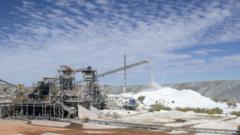Amid escalating trade tensions, Australia's Prime Minister Anthony Albanese has pledged A$1.2bn to bolster a strategic reserve for critical minerals, crucial for advanced technologies, including electric vehicles and defense systems.
Australia Aims to Counteract China's Rare Earth Export Halt with Strategic Investments

Australia Aims to Counteract China's Rare Earth Export Halt with Strategic Investments
In light of China's recent restrictions on rare earth exports, Australia is poised to potentially alter the balance of power in critical minerals supply.
China has imposed export limits on vital rare earth elements, seen as retaliatory measures against U.S. tariffs. As a result, Australia's focus on securing its mineral resources could challenge China's current dominance in this sector, despite the difficulties in refining processes.
Following China's decision to restrict the export of seven rare earth elements vital for high-tech industries, Australia is stepping up efforts to lessen dependency on its trading rival. Albanese's proposed A$1.2 billion investment in critical minerals reserve aims to prioritize essential resources for both national security and allied partners.
Rare earths, consisting of 17 minerals, are essential components in advanced technology production, from electric vehicles to defense systems. Current manufacturing processes are heavily reliant on China, which conducts 90% of global rare earth refining. This has led Western nations to seek alternative sources for these critical components.
The impetus for these restrictive measures by China appears to be a response to the tariffs imposed under the Trump administration, which have heightened anxieties regarding America's supply security for rare earths. Reports indicate that the U.S. relied on China for over 75% of its rare earth imports between 2019 and 2022.
While Albanese's initiative is recognized as a necessary response, experts warn that simply stockpiling resources won't address the core issue of refining control, predominantly held by China. For instance, although Australia is a leading lithium producer, it refines only a minute fraction compared to China's substantial share.
Australia has made strides in developing its refining capacity under the Future Made in Australia plan, which aims to utilize critical minerals to fuel a green transition. Developments include the establishment of Arafura Rare Earths' processing facilities, with more projects anticipated in the coming years.
Nevertheless, projections suggest Australia will still rely on Chinese refining capabilities for the foreseeable future, at least until 2026.
In response to the rising tensions, China's ambassador to Australia criticized U.S. trade policies, urging for collaboration between China and Australia—a suggestion Prime Minister Albanese has firmly rebuffed.
While Albanese's strategy emphasizes protecting Australia's interests and those of its partners from potential adversaries, analysts believe that the plan to sell resources during economic strains will not overshadow China's critical role in refining capacities. The ongoing geopolitical landscape remains complex, as both nations continue to navigate the intricacies of trade and resource management.
Following China's decision to restrict the export of seven rare earth elements vital for high-tech industries, Australia is stepping up efforts to lessen dependency on its trading rival. Albanese's proposed A$1.2 billion investment in critical minerals reserve aims to prioritize essential resources for both national security and allied partners.
Rare earths, consisting of 17 minerals, are essential components in advanced technology production, from electric vehicles to defense systems. Current manufacturing processes are heavily reliant on China, which conducts 90% of global rare earth refining. This has led Western nations to seek alternative sources for these critical components.
The impetus for these restrictive measures by China appears to be a response to the tariffs imposed under the Trump administration, which have heightened anxieties regarding America's supply security for rare earths. Reports indicate that the U.S. relied on China for over 75% of its rare earth imports between 2019 and 2022.
While Albanese's initiative is recognized as a necessary response, experts warn that simply stockpiling resources won't address the core issue of refining control, predominantly held by China. For instance, although Australia is a leading lithium producer, it refines only a minute fraction compared to China's substantial share.
Australia has made strides in developing its refining capacity under the Future Made in Australia plan, which aims to utilize critical minerals to fuel a green transition. Developments include the establishment of Arafura Rare Earths' processing facilities, with more projects anticipated in the coming years.
Nevertheless, projections suggest Australia will still rely on Chinese refining capabilities for the foreseeable future, at least until 2026.
In response to the rising tensions, China's ambassador to Australia criticized U.S. trade policies, urging for collaboration between China and Australia—a suggestion Prime Minister Albanese has firmly rebuffed.
While Albanese's strategy emphasizes protecting Australia's interests and those of its partners from potential adversaries, analysts believe that the plan to sell resources during economic strains will not overshadow China's critical role in refining capacities. The ongoing geopolitical landscape remains complex, as both nations continue to navigate the intricacies of trade and resource management.



















